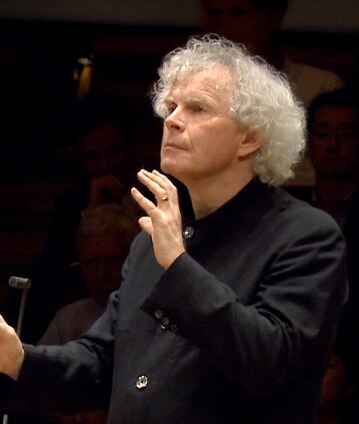Sir Simon Rattle conducts Britten’s “War Requiem”

Benjamin Britten’s War Requiem has a unique place in the history of music. Rather than an abstract, liturgical work, it directly conveys the horrors and devastating grief unleashed by war. In 2013, the year in which the 100th anniversary of Britten’s birth was celebrated, Simon Rattle performed the Requiem for the first time with the Berliner Philharmoniker. In addition to the Rundfunkchor Berlin, the singers included an outstanding ensemble of soloists.
There are works with which one feels a special bond. They are true, lifelong companions. For Simon Rattle, Benjamin Britten’s War Requiem is such a companion, a work he has often performed. In this urgent anti-war appeal, the English composer juxtaposed the Latin Mass for the dead with the shattering poetry of Wilfred Owen, the “war poet” who fell in the last days of the First World War at the age of 25. “I am writing what I think will be one of my most important works. These magnificent poems, full of the hate of destruction, are a kind of commentary on the Mass” (Britten).
The score’s title page contains the following lines by Owen: “My subject is War, and the pity of War. The Poetry is in the pity. All a poet can do today is warn.” Britten set the various texts to music of immense vividness, expressive flexibility and dramatic consistency. The War Requiem was premiered with overwhelming success on 30 May 1962 in the newly rebuilt Coventry Cathedral, which had been destroyed in a German air raid in the Second World War.
Five days earlier William Mann, long-time chief music critic of the Times of London, had written: “Any new Requiem setting has to compete with Verdi’s and Fauré’s and Mozart’s treatment of the same words. Britten has approached the task in his own fresh and deeply felt way. It is not a requiem to console the living. Sometimes it does not even help the dead to sleep soundly. It can only disturb every living soul, for it denounces the barbarism more or less awake in mankind with all the authority a great composer can muster. There can be no doubt: this is Britten’s masterpiece.”
© 2013 Berlin Phil Media GmbH
Related interview
Artists
Our recommendations
- Gustavo Dudamel conducts Mahler’s Second Symphony
- Simon Rattle conducts Tippett’s “A Child of Our Time”
- A Verdi evening with Christian Thielemann
- Yannick Nézet-Séguin conducts works by Tchaikovsky and Ravel
- Manfred Honeck and Matthias Goerne
- Murray Perahia and Simon Rattle with Schumann’s Piano Concerto